General
Graduate Freshers Called to Create Knowledge and Impact Society
Published
2 years agoon
By
Jane Anyango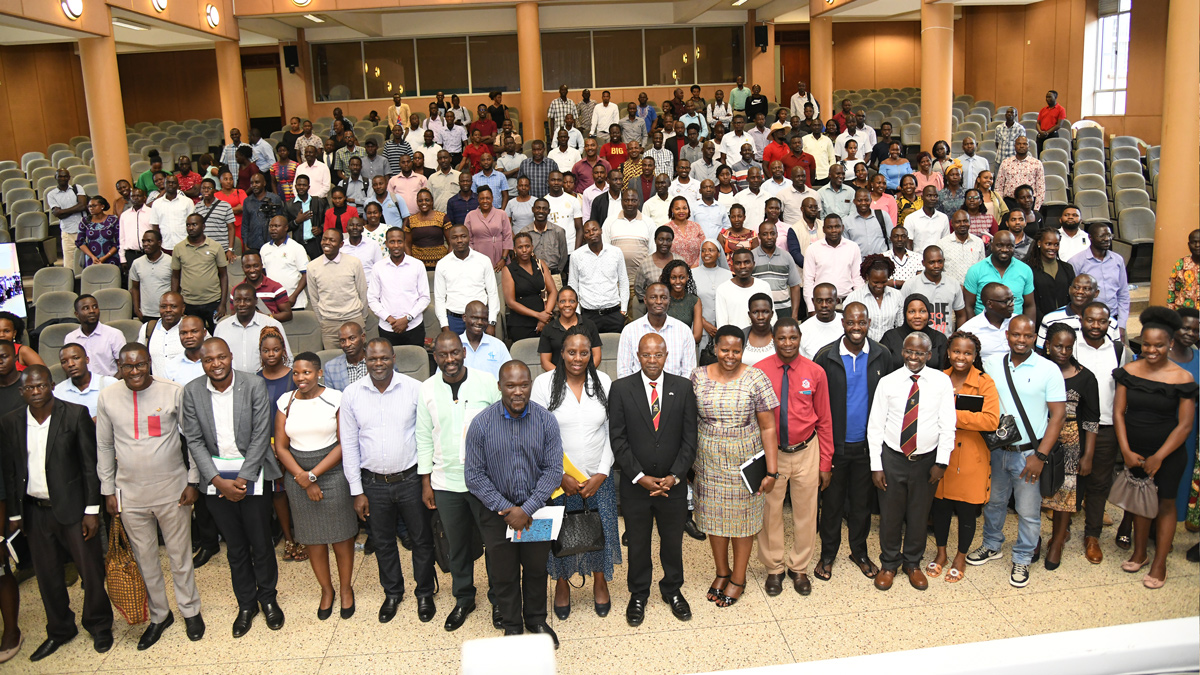
Makerere University Graduate freshers for the academic year 2023/2024 have been described as the architects of knowledge production, the pioneers of innovation, and the catalysts of progress.
The Director, Directorate of Graduate Research and Training (DGRT) Prof. Edward Bbaale gave the aforementioned description while delivering his welcome message during the Graduate Freshers induction held on 6th September 2023 in the Yusuf Lule Auditorium. The meeting attracted over 700 students physically and another over 380 participants online.
The orientation organized by the DGRT under the theme, “In Pursuit of a prosperous Future: Positioning Makerere Graduate Students to lead societal transformation” was attended and addressed by university officials from the Senate, Department of Academic Registrar, Directorate for Information and Communication Technology (ICT) Support-DICTS, Colleges, Counselling and Guidance Centre, and the Institute of Open, Distance and E-learning (IoDEL), who all reiterated the call to generate knowledge for societal transformation.
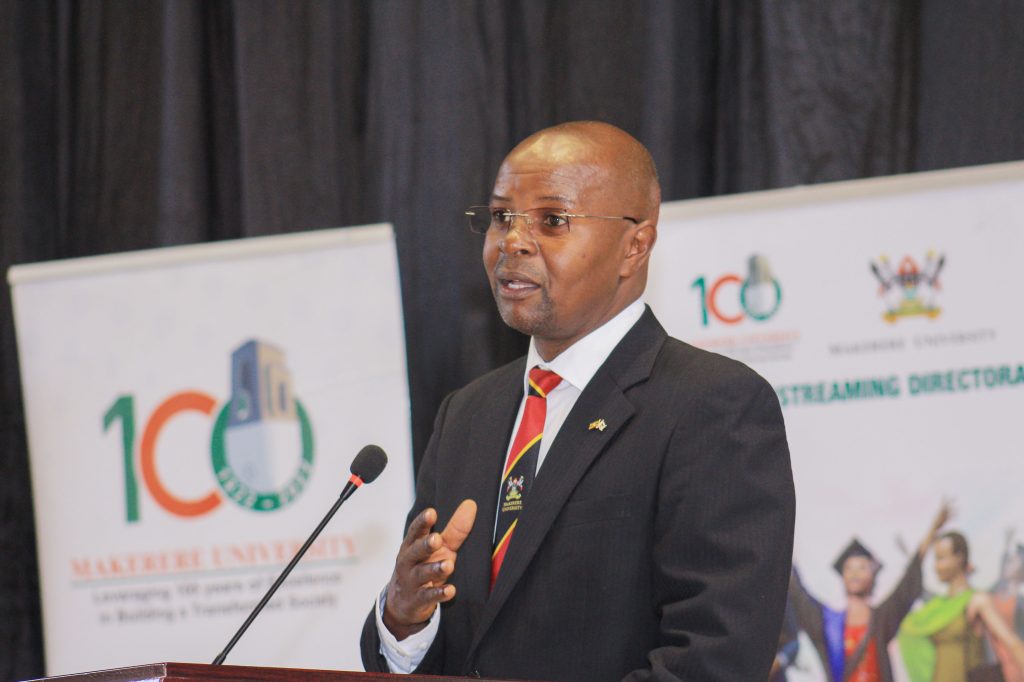
Welcoming the students to Makerere, Professor Bbaale said, the university has set its sights on a bold vision: to become a research-led and innovation-driven university, with graduate training at the very core.
“We hold in high regard the role of graduate students as the architects of knowledge production, the pioneers of innovation, and the catalysts of progress. It is your passion, your dedication, and your thirst for discovery that will shape the future of our university and contribute to the betterment of society as a whole,” the Director asserted.
With the University having celebrated a century of existence and outstanding service to humanity, Bbaale expressed optimism for boundless opportunities that lay ahead of the students.
“Makerere University stands as a light of academic excellence, not only within our region but also on the global stage. You, our newly admitted graduate students, should feel a profound sense of pride to be joining an institution of Makerere‘s caliber. Your admission reflects not only your own remarkable accomplishments but also the enduring reputation of this venerable institution”, he stated.
Prof. Bbaale expressed the University’s commitment and readiness to support and provide students with the tools and resources required to transform challenges into opportunities adding that, the University believes in nurturing critical thinkers and problem solvers.
“Within our hallowed halls, you will find an assembly of expert faculty members, distinguished in a multitude of fields, eager to guide and mentor you in your academic journey. Their guidance will be an invaluable compass, steering you towards academic excellence and groundbreaking research”, the Director added.
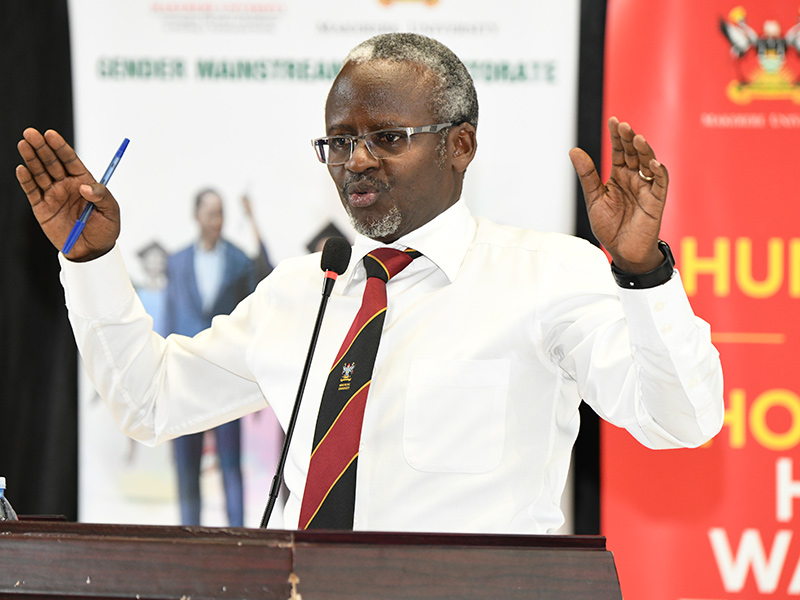
In addition to being a firm advocate of interdisciplinary education and research, and recognizing that some of the most transformative discoveries emerge at the crossroads of disciplines, Bbaale stated that Makerere University embraces collaborations, internationalization, mutually beneficial partnerships, and a global perspective.
Further, Bbaale affirmed that the university’s state-of-the-art facilities, including well-equipped laboratories will serve as the crucibles of their intellectual exploration and experimentation.
“But our commitment extends beyond the classroom. Makerere University offers a rich array of academic programs and extra-curricular offerings that promise to enrich your experience and nurture holistic development. Our campus is a tapestry woven with the dedication of our committed academic and support staff, individuals who will make your time at Makerere University unforgettable.
“To you, our new graduate students, I offer this advice: seize every opportunity, embrace every challenge, and tap into the professional assistance and support that our university provides. Your journey will undoubtedly be marked by achievements, discoveries, and contributions that will leave an indelible mark on our institution and the world at large” the Director encouraged.
Prof. Bbaale concluded by remarking that the graduate students’ journey of incredible achievements had just began, and expressed hope to witness the remarkable impact students will make at Makerere – a University, where their seeds of success had found fertile ground.
University Commits Next 10 years to be a Decade of Graduate Students in transforming society
Delivering remarks on policies and guidelines governing graduate training, the Deputy Director in charge of Administration and Graduate Training Assoc. Prof. Julius Kikooma expressed the commitment of the university towards supporting graduate students.
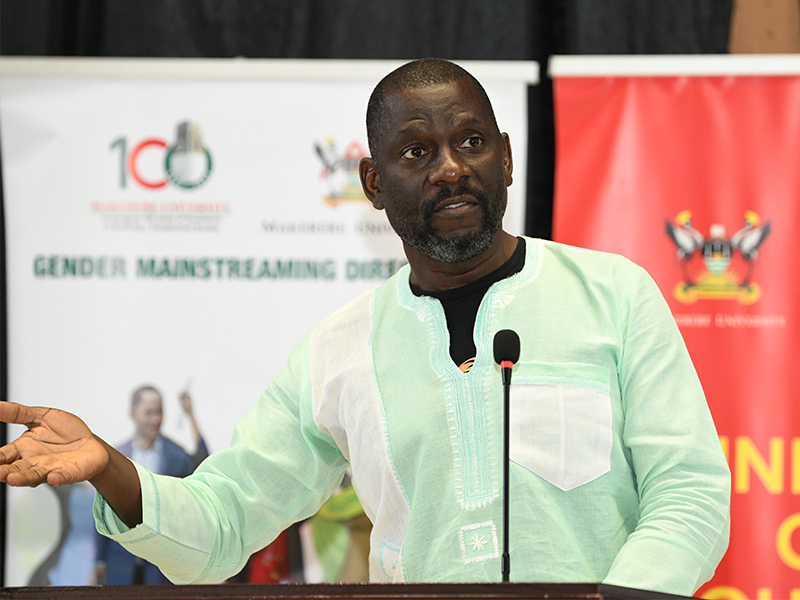
Assoc. Prof. Kikooma described DGRT as prefects in this question of graduate training, adding that the Directorate coordinates the implementation of the guidelines, the policies and the regulations needed to be followed through the programs by the students as well as the academic staff and the units.
Congratulating students upon their successful admission to Makerere, Prof. Kikooma told students that they have come at a time when the university has fully and totally committed to improving graduate training.
The 2023 Graduate students according to Kikooma come at a time when the university has just completed its centennial celebrations, and is reflecting on how its teaching, research, and knowledge transfer partnerships are impacting communities.
“One of the core issues that the university has committed to is making this a decade of graduate students, meaning that you are going to be at the center of focus of what we do in terms of teaching, research, and engaging with the wider public and immediate communities. And, we the academic staff have to work together with you, the students, in that commitment”, Kikooma stated.
He said that the theme for the induction was deliberately considered not just as an orientation to teach students to go around the campus but as an occasion meant to ensure that students and the entire university management are on the same page as a partners in the transformative journey.
Kikooma emphasised that the DGRT was inducting students into what it means to be part of transforming society, but with teachers charged with a responsibility of passing on knowledge, skills and wisdom to graduates who must undertake a bigger responsibility.

“We are saying that, we need you to appreciate that the university has committed the next 10 years, to produce a certain type of graduate student that is sensitive and is alive to what is needed to change this society.
We’ve done a lot in the last 100 years as an institution to produce people that have done what they could to take Uganda to where it is now, but, the next seed of students must be sensitive and be able to appreciate that it’s not enough for us to focus on coming here for knowledge.
It is about understanding the problems and how you can use and translate the knowledge that you are getting here into solutions for the immediate society and the immediate community that we actually live in. Uganda is still not as resourced as others in terms of wealth, and as such, we are the only hope of the society and communities where we come from,” Kikooma advised.
Three essential documents for students to guide and keep track in their academic journey
Kikoma outlined three important documents that graduate students need to pay attention to in order to move seamlessly through their academic journey.
These include the Makerere University Student Guild Statutes, which has guidelines and policies that address student support issues and how graduate students can be part of the student governance in the university. Section seven, outlines eleven organs of the student guild and other organs on postgraduate student union, as channels through which graduate students will be part of discussions that engage policy areas, at the Senate, Council and College levels.
The second document is the Makerere University Student Guild Constitution. The Student Guild Constitution contains the Guild Student Provisions and the Postgraduate Student Union requiring that graduate students become integrated and feel part and parcel of the student guild activities as part of the student voice of Makerere University.
And lastly, the Graduate Student Handbook (2013), currently under review, that will help students to keep on track of policies and regulations on: student registration, study plans, cross cutting courses, examination regulations and general regulations. Other sections of the handbook cover teaching and learning, examination malpractices and how to appeal, including ethical issues, conflict of interest when given a supervisor, and graduation guidelines.
As prefects, Kikooma pledged to work with students through the structure that exists so that they spend only that time that they are contracted to be here at Makerere University.
The Principal Registrar DRGT, Ms. Prossie Nakayiki reemphasized that registration is key and urged students to take careful note of their application credentials, and visit the admission office in case of any enquiries.
Nakayiki advised students to visit the respective school registrars with original transcripts for verification and registration, adding that the subsequent registration for continuing students will be done online.
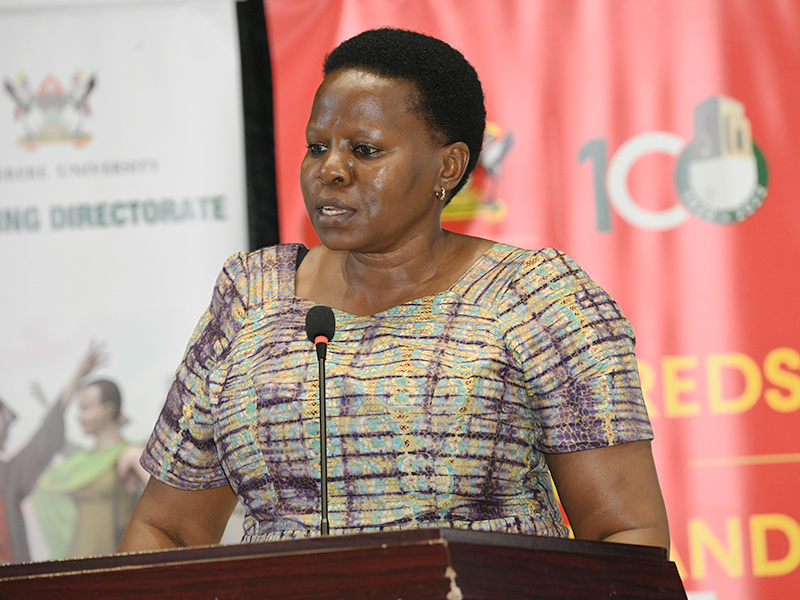
“Make sure you create a personal file where you keep all your correspondences. You are not a student unless you are registered. Registration is done within the first six weeks of the semester”, she said.
Nakayiki guided students on matters of deferment, withdrawal from the program, refund of tuition fees and general challenges faced by graduate students as well as sexual harassment as a real vice.
The 21st Century skills for Students to be professional, analytical and change agents of society
Addressing students on , “Positioning Makerere University Graduate students to lead societal transformation and development” Dr. Rhoda Wanyenze, a Professor of medicine, public health, and also Dean School of Public Health expressed the need for students to go beyond technical skills and acquire social, leadership, values and other competencies in order to be relevant and impactful to society.
Prof. Wanyenze noted that although the university provides knowledge and skills, graduate students ought to grow themselves to acquire other competencies beyond the classroom and work towards impacting others.
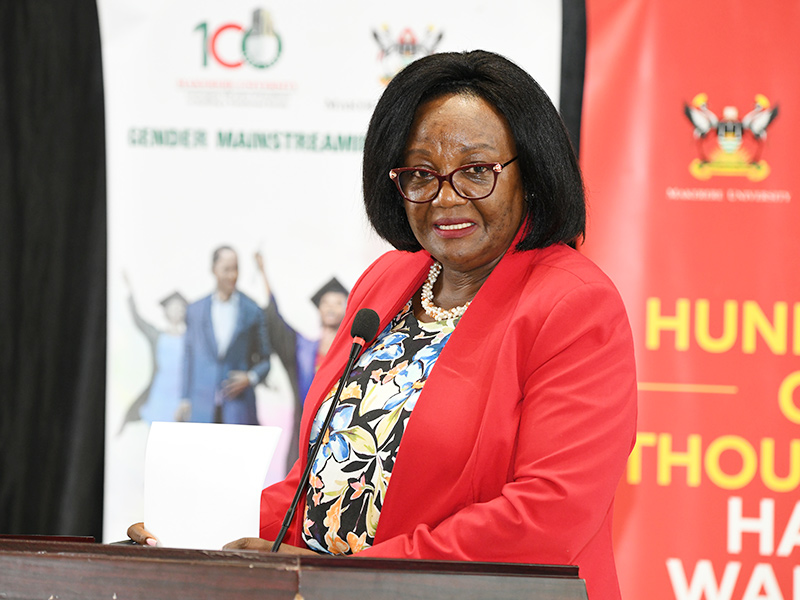
“Because you’ve got the skills, you’ve got the competencies, and you’ve got the vision and purpose to create a difference for others, you always have work, because there are always problems to solve.
“But you can’t give what you don’t have. So you’ve got to grow yourself in terms of knowledge, professionalism because we want you to change the world. There are too many problems in the world. You can make the world easier for others, and when you do, you will never lack work” she advised.
Prof. Wayenze emphasized that no matter their place of work, titles or ranks, so long as they are working with communities, students have to learn to communicate, lead, and do things differently.
“Whether you are representing your classroom, whether you’re in research, in academia, you’re leading research teams, many people get money and they can’t even implement because they don’t know how to lead and manage teams. So we need to grow our leadership capabilities.
“We need to grow our creativity. Think, think different. Do something different. Don’t just take things the way they are because that’s what they’ve always been. You are not going to change the world when you come and continue what everybody has done.
“These days the world is global. You’re going to work with people across different countries, cultures and races. You’re going to work with younger people and older people. We need to learn to work across the divide. How will you work with the world when you can’t even work across a tribe in your country? You need to learn to work with people that are different from you. Ideas come not from the people that are like you. New ideas come from the people that think different from you, that have a different experience from yours,” the Dean advised.
Prof. Wanyeze underscored the importance of acquiring Social competencies in leading and transforming the world, working with communities and understanding their experience and their knowledge to make them better.
She called on students to be creative and find ways of picking up and exposing themselves to other social competencies required such as advocacy and lobbying, which are key to explaining data or evidence for policy makers, as well as writing and analytical skills, and innovation, which are important in many areas such as managing projects.
Wanyenze implored students to do their best and ensure they finish within the program time, use knowledge and skills acquired to look for opportunities where they can lead, show people a direction, mentor and support one another.
Where there are debates, the Dean advised students to participate, as they help improve one’s skills in communicating and getting their points across. She also advised students on the need to get involved in networks, partnerships and research with their colleges.
“Life is about identifying what you want and going for it. Don’t be that person that feels like the world is against you all the time because you didn’t get what you wanted. The world doesn’t know what you want. Know what you want and go for it. Be proactive and seek opportunities.
“And people say, they hire you for qualifications, they fire you for those skills we call soft. Embrace technology. This is a world of technology. Grow your networks and learn at least one foreign language” remarked Prof. Wanyenze.
Graduate studies to take the blended learning, or open distance and e-learning as a mode of delivery
Presenting on online learning, Director of the Institute of Open, Distance and E-learning (IoDEL), Prof. Paul Muyinda Birevu decried the fact the graduate student of the 21st Century is faced with challenges of balancing work and meeting family needs while studying and, at the same time, the requirement to participate in different political, social and religious activities as they study.
Sensitising students on the new approach to teaching and learning, Prof. Muyinda said Makerere University set up IoDEL to nurture the growth of blended learning.
Muyinda implored students to acquire the necessary skills and be prepared for the university electronic learning environment and virtual classrooms that will supplement face-to-face teaching.
“That means that there will be a lot of online learning activities that you’ll be taking, and therefore you will need some skills on how to study online. Many people who study online actually fail to study because they lack the skills of studying online.
“Makerere University not only has physical classrooms as you see them here, but also the virtual classrooms, which are hosted on Makerere University Electronic Learning Environment (MUELE),” he said.
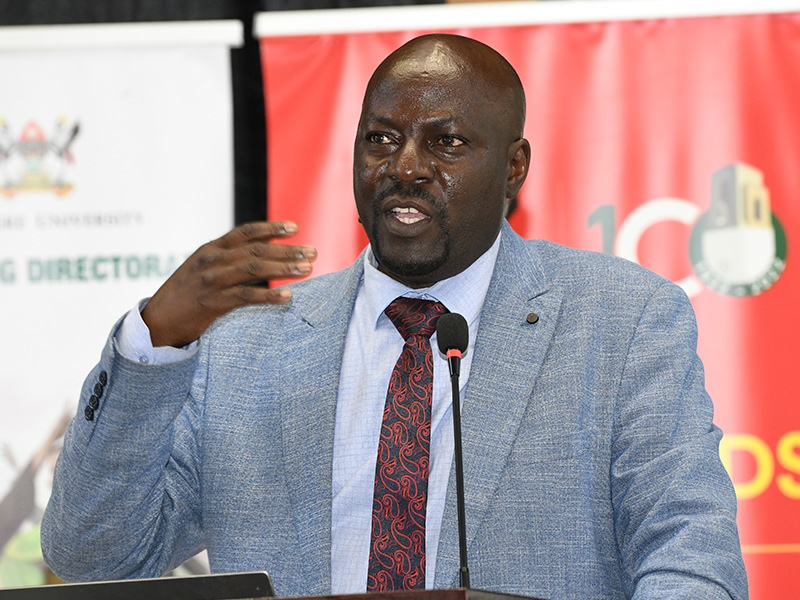
Prof. Muyinda explained that traditional face-to-face delivery mode which is teacher-centered assumes that the instructor as knowledgeable person to pump knowledge into students heads.
He advised that with the changing world and especially at graduate level, the university emphasises approaches to teaching and learning that induce generation of knowledge, even from students to professors as well.
“Makerere University has been offering distance education since 1991. We have been having distance education programs, where students stay wherever they are and learn.
“Many of the accountants that you have in Uganda, many of the education professionals, many of these people have trained us through the distance education mode. So we don’t have to disturb them in their workplaces”. He added
Prof. Muyinda shared that distance education has gone through a number of generations from the days when instructor used to send the materials to students to read from wherever they are. With the coming of technology, he affirmed that the university lecturers can send the materials to students and interact with them through technology as was the case during the CoVID-19 lockdown.
“There will be a lot of technology infusion. Your lecturers, because they have had a dose of blended learning and a dose of online learning during CoVID-19, and because there is a lot of campaign by Makerere University to integrate technology-mediated teaching and learning, you’ll find that most of your lecturers are going to be using online learning, where they will work with you on the e-learning management system (MUELE) or using the synchronous system like Zoom”, he explained.
Prof. Muyinda told students that the lecturers are developing online materials and hence the need for them to be able to quickly enroll themselves and get to the Learning Management System, saying all units have support champions to assist them gain access to online resources.
To venture into online learning, Prof. Muyinda implored students to acquire ICT skills, be self-driven, ready to share work with others, interact in small groups, and have good communication skills.
“You need to be self-directed at graduate level because no one is going to be forcing you to do anything, the reasons why some students fail to complete in time. We need self-directed learners, learners who can manage their own time. And online learning requires such learners. If you are not self-directed, online learning will be very difficult for you to complete. So you must be self-motivated” He cautioned.
Apart from minimizing costs, Prof. Muyinda highlighted a number of benefits accruing from online learning including enabling student-centered teaching and learning, co-creation of knowledge, and availability of course materials at no cost (e.g. photocopying) at any time.
Presenting on ACMIS and benefits of ICT to a graduate student, the End User Support Administrator DICTS, Mr. Yunus Musisi advised students to get Makerere University email addresses as gate passes to access systems. He cautioned students to be careful with sharing their personal information online because it can be accessed by cyber-criminals.
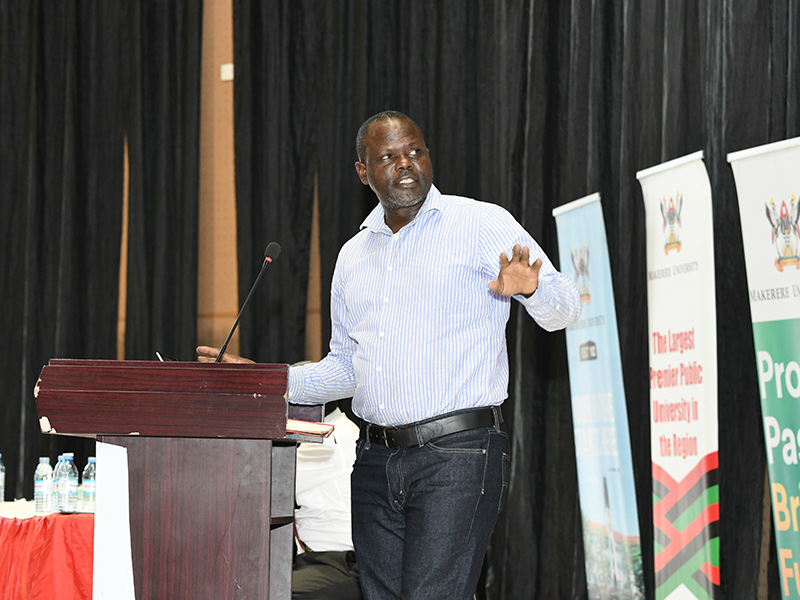
Mental health key to successful Graduate studies
Presenting on services available at the Counselling and Guidance Centre, the Director of Counseling and Guidance, Dr. Henry Nsubuga said the university established the unit to take care of psychological and emotional issues affecting staff and students.
“You can’t be physically healthy if you are not psychologically or mentally healthy. Actually, mental health takes precedence.” Dr. Nsubuga said.
Dr. Nsubuga highlighted; a wounded past, those coming from countries affected by war and have been traumatized, and a host of other factors as causes that would require students to seek counseling services.
Additionally, he advised that students who could have had a difficult childhood might need support on grounds that some of the suffering adults currently face results from unresolved childhood issues. This, he added, affects their self-confidence and esteem levels.
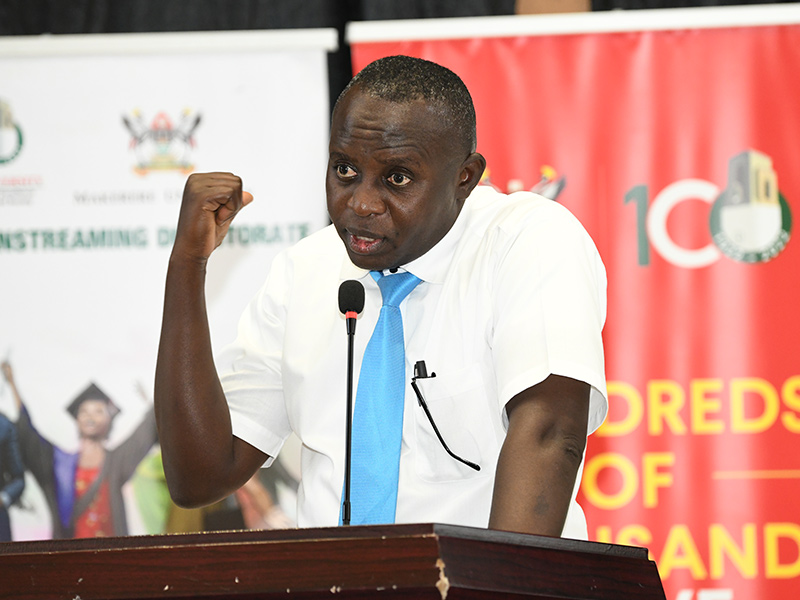
“It is very important that we receive services to deal with some of the issues that could be coming from the past because we are growth oriented. As human beings, we want to improve every other day. It doesn’t matter whether you are a professor or student, at some point you may be lagging in something”, He counselled.
Nsubuga justified the need for a supportive system on the basis that no human is immune from problems and emergencies that could arise from relationships, family, losing a job rigorous graduate training, lack of resources, or even loss of a dear one.
The Library, An essential resource to a graduate student
The University Librarian, Assoc. Prof. Ruth Nalumaga introduced students to library services, and sections notably; the Africana section, special collection and archives section the legal repository, and the research commons for graduate students.
Dr. Nalumaga introduced the ICT training lab, document delivery services and databases that can be ordered or downloaded among services offered.
She added that the library conducts e-resources training to help students understand how to get the best and relevant data. In addition, the library, she said, trains students how to reference their work properly using accepted formats including information on ethics and problems arising like respect for intellectual property rights.
“You must attribute the source of your information so as not to fall in the trap of plagiarism. Avoid unauthorized access to databases and do not violate, misuse or share passwords. Photocopying a whole document is a violation of copyright because the maximum allowed is three chapters”, the Librarian cautioned.
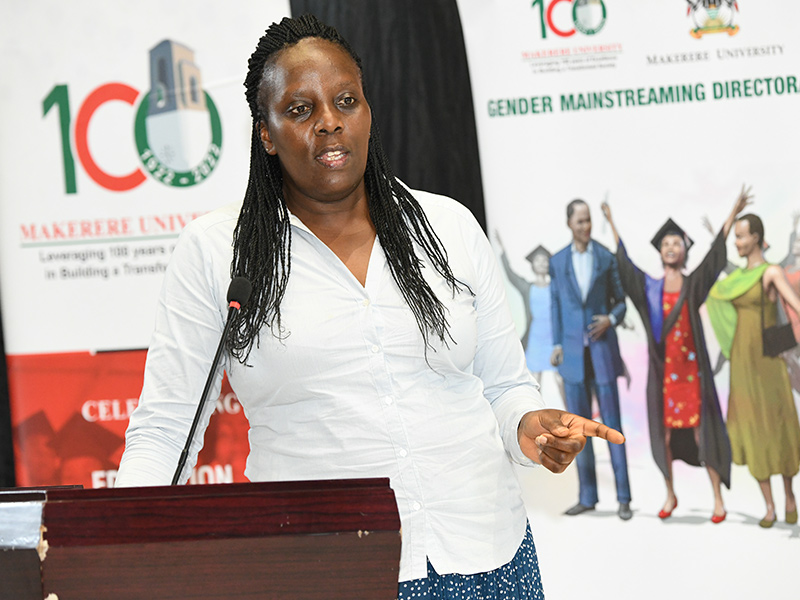
The Graduate journey is interesting with highs and lows says, Graduate student
Speaking on the journey of postgraduate studies at Makerere University, the Chairperson Graduate Students Union Douglas Bulafu congratulated students upon their successful admission to Makerere University. He described the journey as worthwhile.
“The journey as a student at Makerere University is worth it and full of highs and lows. The journey is very interesting, but also lonely sometimes, for example for the PhD student, you reach an extent and you feel you’re in your own world.
“But with the support system that has been spoken about, I believe you will make it as a postgraduate student. Masters students are always close to each other. I really know that. So yours is not as much as lonely a journey as the PhD students’.
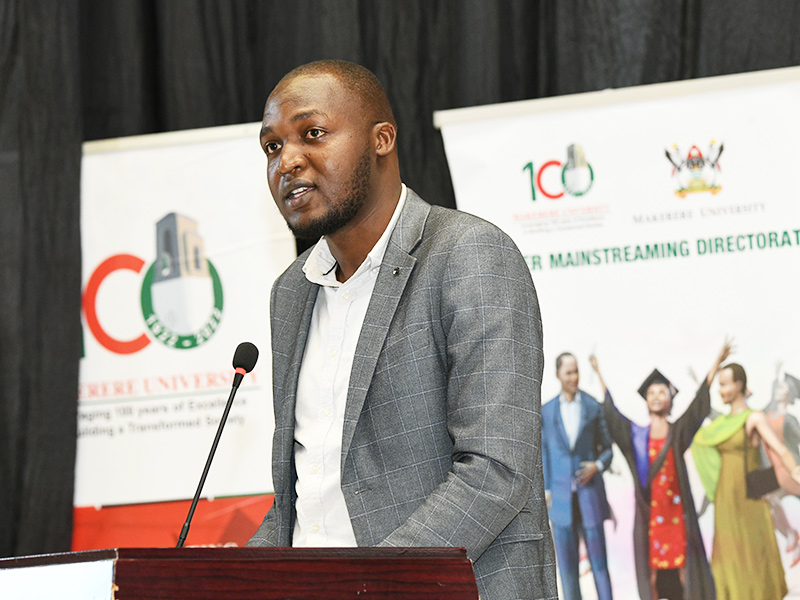
“The journey at Makerere University is all about self-drive. No one is going to push you to go to class. No one is going to tell you to do coursework. No one is going to tell you to go and sit for an examination. But it is up to you as a student. To know that it is your responsibility to attend class and do coursework” Bulafu said.
He pointed out some of the challenges faced by graduate students including financial challenges and how to strike a balance between work, studies and family.
He informed students of the university leadership structures that take on graduate students, from DRGT, the Dean of Students, Colleges, Schools and Departments, and at the classroom level with class coordinators.
The roles of the Union, Bulafu said, include linking students to the administration, representing students on a College Academic Boards and at the Guild level, urging them not to leave student leadership to only undergraduates.
The Union, he said, also collaborates with other entities in the University such as the Counseling and Guidance Center, Makerere Innovation Hub and organizes graduate student assemblies.
You may like
-


CAES Presents Overall Best Performing Student in the Sciences & a Record 28 PhDs at the 76th Graduation Ceremony
-


Over 9,200 to graduate at Makerere University’s 76th Graduation
-


76th Graduation Highlights
-


Mak Selected to Host Alliance for African Partnership Africa Office
-


Mak hosts First African Symposium on Natural Capital Accounting and Climate-Sensitive Macroeconomic Modelling
-


Olivia Nakisita and the Quiet Urgency of Adolescent Refugee Health
General
Graduation marks the next phase of accountability, graduates told
Published
1 day agoon
February 25, 2026
“A degree is not a finish line. Graduation is not the end of learning, It is the beginning of accountability,” Prof. Nicholas Ozor, the Executive Director of the African Technology Policy Studies Network Nairobi, Kenya (ATPS), said.
Delivering a keynote address under the theme ‘Knowledge with purpose’, during Makerere University’s 76th graduation ceremony on Tuesday 24th February, Prof Ozor, challenged graduates to see their degrees not as status symbols, but as instruments of responsibility.
In his speech, he painted a candid picture of the world the graduates are stepping into, one marked by climate change, technological disruption, inequality, food insecurity and the rapid spread of misinformation. Yet rather than framing these challenges as obstacles, he described them as opportunities for purposeful leadership.
“Into this world, you step, armed with knowledge, credentials, and potential. Your degrees do not make you better than others. They make you responsible for others,” Prof Ozor, said.
Addressing graduands from College of Agricultural and Environmental Sciences (CAES)
College of Computing and Information Sciences (CoCIS), College of Education and External Studies (CEES) and School of Law (SoL), Prof. Ozor tailored his message to each field of study.
To graduates of the School of Law, he described the legal profession as a moral calling, urging them to use the law to protect the vulnerable and uphold justice with courage.
“Uganda, Africa, and the world do not need lawyers who only know how to argue. They need lawyers who know why they argue. Use the law to protect the weak, not intimidate them. Use your knowledge to defend justice, not delay it. Let integrity define your reputation not merely your résumé,” Prof Ozor, said.
For graduands who might feel that shortcuts will be tempting and silence will feel safer than truth, Prof. Ozor reminded them that justice does not need clever people, but courageous ones.
To the College of Education and External Studies, he underscored the transformative power of teachers, reminding them that classrooms shape nations long before policies do.
“Every nation rises and falls on the quality of its teachers. Never underestimate the power of a classroom. Teach not only for examinations, but for understanding. Teach not only content, but character. Teach learners how to think not what to think. Education is quiet work but its impact echoes across generations,” Prof Ozor, noted.
He called upon graduands from the College of Computing and Information Sciences, to use technology to solve African problems, not merely to imitate foreign solutions.
“Technology is powerful, but it is not neutral. Every line of code carries values. Every system you design affects real lives. Build for inclusion. Build for accessibility. Build for truth. Do not let innovation outrun ethics. The future will not belong to those who know the most technology, but to those who use it wisely,” He noted.
During the ceremony, Prof Ozor announced that the African Technology Policy Studies Network is offering PhD scholarships and postdoctoral fellowships in Artificial Intelligence, inviting deeper collaboration with Makerere.
For graduates of the College of Agricultural and Environmental Sciences, he highlighted their critical role at the intersection of sustainability and survival, calling on them to blend indigenous knowledge with scientific innovation to secure Africa’s food systems and protect its ecosystems.
In closing, he reminded graduands that their integrity will open doors their degrees cannot, their humility will teach them lessons success never will, and their resilience will matter more than their grades.
Five principles to be remembered:
- Embrace lifelong learning. The world changes too fast for static knowledge.
- Choose purpose over comfort. Impact matters more than income.
- Build character before career. Skills get you hired; character sustains you.
- Serve something larger than yourself. Give back to your communities and your country.
- Believe in Africa, and act. Do not wait for solutions from elsewhere. Be the solution.
General
Over 9,200 to graduate at Makerere University’s 76th Graduation
Published
2 days agoon
February 24, 2026
Pomp and colour defined the opening day of the Makerere University’s 76th Graduation Ceremony as thousands gathered to celebrate academic excellence and new beginnings.
The historic ceremony has brought together scholars, families, friends and industry partners in a vibrant celebration of achievement and possibility. Throughout the four-day event, the University will confer degrees and award diplomas to 9,295 graduands in recognition of their dedication and hard work.
Among the graduates, 213 will receive Doctor of Philosophy (PhD) degrees, 2,503 will graduate with Master’s degrees, and 6,343 will earn Bachelor’s degrees. In addition, 206 students will graduate with postgraduate diplomas, while 30 will be awarded undergraduate diplomas.
Of the total number of graduands, 4,262 are female and 5,033 are male. According to Vice Chancellor, this marks the first time in 15 years that male graduands have outnumbered their female counterparts.
The best overall graduand in the Sciences, Esther Ziribaggwa, graduated on the opening day with the Bachelor of Agricultural and Rural Innovation and an impressive Cumulative Grade Point Average (CGPA) of 4.77.

The ceremony marks a proud moment for Makerere University as it continues to nurture top-tier professionals across diverse fields.
While presiding over the graduation, the State Minister for Primary Education, Hon. Dr. Joyce Moriku Kaducu, on behalf of the First Lady and Minister of Education and Sports, Hon. Janet Kataaha Museveni, pointed out that Makerere University is a model institution, where leaders are nurtured, scholars are sharpened, and where dreams have been given direction.
In her address, Hon. Museveni, highlighted Government’s deliberate investment in research, innovation, and infrastructure to strengthen higher education in Uganda.
“The establishment of the Makerere University Research and Innovation Fund (RIF), supports high-impact research and innovation that directly contributes to national priorities and development. Through this initiative, thousands of researchers and innovators have pursued practical, scalable solutions that are transforming communities and key sectors across Uganda,” Mrs Museveni, said.
The Minister also noted that Parliament’s approved a USD 162 million concessional loan to upgrade science, technology, and innovation infrastructure at Makerere University. The funding will facilitate the construction of modern laboratories, smart classrooms, and state-of-the-art facilities for Engineering and Health Sciences, investments expected to position the University firmly within the Fourth Industrial Revolution.
“Government has embarked on the construction of a National Stadium at Makerere University and other institutions of higher learning across the country. This will promote physical education, strengthen talent identification, and boost investment in the sports sector,”

Turning to the graduands, the Minister encouraged them to see themselves not merely as job seekers, but as job creators and solution-makers.
Uganda and Africa need innovators who will modernize agriculture; engineers who will build quality infrastructure; healthcare professionals who will strengthen health systems; and educators who will inspire the next generation,” the Honourable Minister said.
She reminded graduates that they are entering a rapidly changing world shaped by Artificial Intelligence, climate change, and shifting global markets. To thrive, she advised them to remain adaptable, creative, and committed to lifelong learning.
She also encouraged graduates interested in entrepreneurship to tap into the Government’s Parish Development Model, which provides community-based financing and production support.
Quoting Proverbs 3:5–6, the Minister urged the graduates to trust in God as they embark on their next chapter.
She extended special appreciation to the Mastercard Foundation for its 13-year partnership with Makerere University in expanding access to education and empowering young people in Uganda and beyond.
In his speech, the Chancellor of Makerere University, Dr Crispus Kiyonga, urged graduands to harness research, innovation and technology to drive Uganda’s transformation.

“This is a milestone in your lives. You have invested time, discipline and hard work to attain these qualifications. It is important that you derive value from this achievement, not only for yourselves, but for your families and for society.” Dr Kiyonga, said.
Dr. Kiyonga expressed gratitude to the Government of Uganda for its continued financial support to the University, particularly the funding allocated under MakRIF, which he described as critical in strengthening the institution’s research capacity.
“Research plays a very vital role in the development of any community. Makerere as the oldest University in the country is doing a significant amount of research, However, more work is required to mobilize additional resources to further strengthen research at the University.” Dr Kiyonga, noted.
Acknowledging the challenges of a competitive job market, Dr. Kiyonga encouraged graduates to think beyond traditional employment pathways.
“It is true that the job market may not absorb all of you immediately. But the knowledge you have acquired is empowering. You can create work for yourselves, individually or in teams.” Dr Kiyonga, said.
He advised the graduands to embrace discipline, integrity and adaptability in the workplace, and to take advantage of technology and digital platforms to innovate and respond to societal challenges.
“Every development challenge presents an opportunity. Believe that you can apply your knowledge to create solutions with impact.” He said.
Addressing the congregation, the Vice Chancellor, Prof Barnabas Nawangwe, congratulated the graduands, particularly staff and societal leaders on their respective achievements.

“I congratulate all our graduands upon reaching this milestone. In a special way I congratulate the members of staff, Ministers, and Members of Parliament that are graduating today as well as children and spouses of members of staff,” Prof Nawangwe, said.
In his speech, Prof Nawangwe, recognized outstanding PhD students, particularly members of staff. who completed their PhDs in record time without even taking leave from their duties.
He called upon graduates not to despise humble beginnings but rather reflect on the immense opportunities around them and rise to the occasion as entrepreneurs.
“You are all graduating with disciplines that are needed by society. We have equipped you with the knowledge and skills that will make you employable or create your own businesses and employ others. Do not despair if you cannot find employment. Instead, reflect on the immense opportunities around you and rise to the occasion as an entrepreneur,” Prof Nawangwe, said.
Prof Nawangwe called upon the graduands of PhDs to use their degrees to transform the African continent.
“As you leave the gates of Makerere I urge you to put to good use the knowledge you have received from one of the best universities in the World to improve yourselves, your families, your communities, your Country and humanity. Let people see you and know that you are a Makerere alumnus because of the way you carry yourself in society with dignity and integrity. Put your trust in God and honour your parents and opportunities will be opened for you,” Prof Nawangwe, said.
Delivering a key note address, Prof. Nicholas Ozor, the Executive Director of the African Technology Policy Studies Network Nairobi, Kenya ((ATPS). Reminded the graduates that a degree is not a finish line but the beginning of accountability. “The world is a complex, fast changing and deeply unequal. Degrees make you responsible for others not better than them,” Prof Ozor, said.

The 76th Graduation Ceremony of Makerere University will be held from Tuesday 24th to Friday 27th February, 2026. A total of 213 PhDs (87 female, 126 male), 2,503 Masters (1,087 female, 1,416 male), 206 Postgraduate Diplomas (80 female, 126 male), 6,343 Undergraduate Degrees (2,999 female, 3,344 male), and 30 Undergraduate Diplomas (9 female, 21 male) will be graduating from all the Colleges.
Ms. Sarah Aloyo and Ms. Nakato Dorothy both students of the Bachelor of Procurement and Supply Chain Management emerged as the best in the Humanities and Best Overall students with a CGPA of 4.93. Mr. Ssewalu Abdul, a Bachelor of Leisure and Hospitality Management student emerged second best in the Humanities with a CGPA 4.90. Ms. Esther Ziribaggwa emerged as the best student in the Sciences with a CGPA of 4.77 in the Bachelor of Agricultural and Rural Innovation, while Mr. Simon Mungudit emerged second best in the Sciences with a CGPA of 4.76 in the Bachelor of Science in Petroleum Geoscience and Production.
Commencement Speakers
- Day 1 – Prof. Nicholas Ozor, the Executive Director of the African Technology Policy Studies Network, Nairobi, Kenya
- Day 2 – Prof. Dr. Maggie Kigozi, Chairperson Makerere University Endowment Fund Board
- Day 3 – Dr. Patricia Adongo Ojangole, Managing Director, Uganda Development Bank Limited
- Day 4 – Ms. Reeta Roy, Former President & Chief Executive Officer, Mastercard Foundation
The 76th Graduation Ceremony will be held at the Freedom Square following the schedule below:
Tuesday, 24th February, 2026
College of Agricultural and Environmental Sciences (CAES)
College of Computing and Information Sciences (CoCIS)
College of Education and External Studies (CEES)
School of Law (SoL)
Livestream Link for Day 1: https://youtube.com/live/wVGPA0FJ9pU
Wednesday, 25th February, 2026
College of Health Sciences (CHS)
College of Natural Sciences (CoNAS)
College of Veterinary Medicine, Animal Resources and Bio-security (CoVAB)
School of Public Health (SPH)
Thursday, 26th February, 2026
Makerere University Business School (MUBS)
College of Business and Management Sciences (CoBAMS)
Friday, 27th February, 2026
College of Engineering, Design, Art and Technology (CEDAT)
College of Humanities and Social Sciences (CHUSS)
Institute of Gender and Development Studies (IGDS)
Makerere Institute of Social Research (MISR)
Trending
-

 Humanities & Social Sciences3 days ago
Humanities & Social Sciences3 days agoMeet Najjuka Whitney, The Girl Who Missed Law and Found Her Voice
-

 Health1 week ago
Health1 week agoUganda has until 2030 to end Open Defecation as Ntaro’s PhD Examines Kabale’s Progress
-

 Agriculture & Environment6 days ago
Agriculture & Environment6 days agoUganda Martyrs Namugongo Students Turn Organic Waste into Soap in an Innovative School Project on Sustainable Waste Management
-

 General1 week ago
General1 week agoMastercard Foundation Scholars embrace and honour their rich cultural diversity
-

 General2 days ago
General2 days ago76th Graduation Highlights
